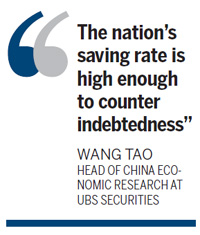Economy
'No systemic risk' for local borrowings
By Wang Xiaotian and Mao Lijun (China Daily)
Updated: 2010-08-20 09:07
 |
Large Medium Small |
BEIJING - The Chinese government said risks related to borrowing by local government-backed investment units are "controllable" and would not cause systemic damage to the economy, as it worked out detailed measures to clean up financing of these vehicles on Thursday.

Some economists are concerned that the problem of local government debt could destabilize the financial system of the world's fastest growing major economy if not managed properly.
Local governments are not allowed to borrow directly from banks or issue bonds to fund deficits and support infrastructure construction.
In consequence, many have set up investment vehicles by using land and fiscal revenue as collateral.
About 8,000 such funding vehicles had been established and by the end of June lenders disbursed more than 7.7 trillion yuan ($1.14 trillion) to finance local government projects, one-fifth of which are classified by the China Banking Regulatory Commission (CBRC) as "questionable".
The Ministry of Finance and the CBRC said in a statement on Thursday that risks in loans to local government financing vehicles indeed exist, but currently the overall risk is manageable and will not cause systemic risk as the majority of the repayments were being met.
"Most of the loans can secure steady and sufficient cash flow and cover the principal and interest. And for loans that may not be repayable, risks can be refined by restructuring debt and increasing collateral," said the statement.
Economists said the loans only account for 20 percent to 30 percent of China's gross domestic product, and there is no possibility of a debt crisis.
"Don't forget Chinese central and local governments have huge assets including the State-owned companies, and the nation's saving rate is high enough to counter indebtedness," said Wang Tao, head of China Economic Research at UBS Securities.
| ||||
The two government agencies said the proportion of new loans to those financing vehicles, in overall bank lending, had been reduced by a third in the first half of this year compared with the whole of 2009.
The authorities are expected to address the problem - partly caused by the 4 trillion yuan stimulus package rolled out at the end of 2008 to shore up economic growth - with measures such as ordering banks to "strictly regulate credit management" for the investment vehicles.
They also plan to restrict local governments from using government revenues, State-owned assets and other "direct or indirect" collateral for loans to the local investment companies.
The regulators also urged assessment and classification of different lending conditions to be based mainly on the purpose, profitability, and payback channels, and asked local finance departments to submit reports on debt conditions of these vehicles before October 31.
Although the government didn't elaborate how to solve old debts generated before June 10, banks still have the possibility to get the money back and the risk of non-performing loans would be quite low, said Lu Zhengwei, an economist with China's Industrial Bank.



